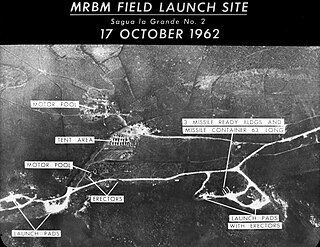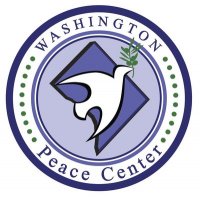
Nuclear disarmament is the act of reducing or eliminating nuclear weapons. It can also be the end state of a nuclear-weapons-free world, in which nuclear weapons are completely eliminated. The term denuclearization is also used to describe the process leading to complete nuclear disarmament.

International Physicians for the Prevention of Nuclear War (IPPNW) is a non-partisan federation of national medical groups in 63 countries, representing doctors, medical students, other health workers, and concerned people who share the common goal of creating a more peaceful and secure world free from the threat of nuclear annihilation. The organization's headquarters is in Malden, Massachusetts. IPPNW was awarded the Nobel Peace Prize in 1985.

Brinkmanship is the practice of trying to achieve an advantageous outcome by pushing dangerous events to the brink of active conflict. It occurs in international politics, foreign policy, labor relations, and military strategy involving the threat of nuclear weapons, and high-stakes litigation. This maneuver of pushing a situation with the opponent to the brink succeeds by forcing the opponent to back down and make concessions. This might be achieved through diplomatic maneuvers by creating the impression that one is willing to use extreme methods rather than concede. The term is chiefly associated with American Secretary of State John Foster Dulles, during the early years of the administration of US President Dwight D Eisenhower (1953-1956). Dulles sought to deter aggression by the Soviet Union by warning that the cost might be massive retaliation against Soviet targets.
Peace Action is a peace organization whose focus is on preventing the deployment of nuclear weapons in space, thwarting weapons sales to countries with human rights violations, and promoting a new United States foreign policy based on common security and peaceful resolution to international conflicts.

Russia and the Iran–Israel proxy conflict deals with Russian foreign policy in the Middle East during the early 2000s, in light of the Iran–Israel proxy conflict.
According to 2012 polls, a majority of Americans supported United States or Israeli military action against Iran. More recent polls report that Americans "back a newly brokered nuclear deal with Iran by a 2-to-1 margin and are very wary of the United States resorting to military action against Tehran even if the historic diplomatic effort falls". Organised opposition to a possible future military attack against Iran by the United States (US) and/or Israel is known to have started during 2005–2006. Beginning in early 2005, journalists, activists and academics such as Seymour Hersh, Scott Ritter, Joseph Cirincione and Jorge E. Hirsch began publishing claims that United States' concerns over the allege threat posed by the possibility that Iran may have a nuclear weapons program might lead the US government to take military action against that country. These reports, and the concurrent escalation of tensions between Iran and some Western governments, prompted the formation of grassroots organisations, including Campaign Against Sanctions and Military Intervention in Iran in the US and the United Kingdom, to advocate against potential military strikes on Iran. Additionally, several individuals, grassroots organisations and international governmental organisations, including the Director-General of the International Atomic Energy Agency, Mohamed ElBaradei, a former United Nations weapons inspector in Iraq, Scott Ritter, Nobel Prize winners including Shirin Ebadi, Mairead Corrigan-Maguire and Betty Williams, Harold Pinter and Jody Williams, Campaign for Nuclear Disarmament, Code Pink, the Non-Aligned Movement of 118 states, and the Arab League, have publicly stated their opposition to such an attack.
Physicians for Global Survival (PGS) is the Canadian chapter of International Physicians for the Prevention of Nuclear War (IPPNW). It is a physician peace activist group that has existed since the early 1980s.

The Washington Peace Center is a justice-oriented grassroots organization founded and currently located in Washington, D.C. The organization provides education, support, and resources to activist groups. The Peace Center aims to strategically link organizations to establish "structures and relationships that are nonviolent, non-hierarchical, humane and just."

The State of Israel is widely believed to possess nuclear weapons. Estimates of Israel's stockpile range between 80 and 400 nuclear warheads, and the country is believed to possess the ability to deliver them in several methods, including by aircraft; as submarine-launched cruise missiles; and the Jericho series of intermediate to intercontinental range ballistic missiles. Its first deliverable nuclear weapon is thought to have been completed in late 1966 or early 1967; which would make it the sixth country in the world to have developed them.
The Challenge of Peace: God's Promise and Our Response is a 1983 pastoral letter of the American Catholic bishops addressing the issue of war and peace in a nuclear age. It reviewed the Catholic Church's teachings about peace and war, reaffirmed the “just war” theory as the main principles for evaluating the use of military force, acknowledged the legitimacy of nonviolence as an alternative moral framework for individuals, evaluated the current issues in US defense policy, and proposed a series of actions that individuals could undertake.
Canada has an active anti-nuclear movement, which includes major campaigning organisations like Greenpeace and the Sierra Club. Over 300 public interest groups across Canada have endorsed the mandate of the Campaign for Nuclear Phaseout (CNP). Some environmental organisations such as Energy Probe, the Pembina Institute and the Canadian Coalition for Nuclear Responsibility (CCNR) are reported to have developed considerable expertise on nuclear power and energy issues. There is also a long-standing tradition of indigenous opposition to uranium mining.
Anti-nuclear organizations may oppose uranium mining, nuclear power, and/or nuclear weapons. Anti-nuclear groups have undertaken public protests and acts of civil disobedience which have included occupations of nuclear plant sites. Some of the most influential groups in the anti-nuclear movement have had members who were elite scientists, including several Nobel Laureates and many nuclear physicists.

The anti-nuclear movement in the United Kingdom consists of groups who oppose nuclear technologies such as nuclear power and nuclear weapons. Many different groups and individuals have been involved in anti-nuclear demonstrations and protests over the years.

The Rideau Institute is a non-profit independent research and advocacy group based in Ottawa. It focusses on foreign policy and defence policy issues.
During the Cold War (1947–1991), when the Soviet Union and the United States were engaged in an arms race, the Soviet Union promoted its foreign policy through the World Peace Council and other front organizations. Some writers have claimed that it also influenced non-aligned peace groups in the West, although the CIA and MI5 have doubted the extent of Soviet influence.

Steven Staples is a Canadian policy analyst. He is president of Public Response, a digital agency that services non-profit organizations and trade unions in the fields of online engagement and government relations.
RightOnCanada.ca is an independent research and advocacy group based in Ottawa, Canada and is affiliated with the Rideau Institute. It is an internet and public advocacy campaign to make human rights a key concern of the Canadian government's political agenda by providing research, analysis and commentary on public policy issues. Supporters of this campaign believe that Canadian citizens feel that their government should play a leadership role in advancing issues such as human rights, social justice, democracy and environmental sustainability. The founder and coordinator of RightOnCanada.ca is Kathleen Ruff. She is the former director of the Court Challenges Program of Canada and the former director of the BC Human Rights Commission. Currently, she is the President of the Rotterdam Convention Alliance and is a senior advisor on human rights to the Rideau Institute. RightOnCanada.ca is an independent organization and does not receive government funding. The only funding it receives is from individual donors. It has purposefully not sought charitable tax status so that it is not restricted in its activism and lobbying activities.

The Campaign for Nuclear Disarmament (CND) is an organisation that advocates unilateral nuclear disarmament by the United Kingdom, international nuclear disarmament and tighter international arms regulation through agreements such as the Nuclear Non-Proliferation Treaty. It opposes military action that may result in the use of nuclear, chemical or biological weapons and the building of nuclear power stations in the UK.

World Beyond War is an anti-war organization with chapters and affiliates in about two dozen countries. The organization bills itself as "a global nonviolent movement to end war and establish a just and sustainable peace." It is opposed to the very institution of war and not just individual wars. World Beyond War pursues the abolition of war through regional organizing along with global campaigns to close military bases and divest from corporations that profit from war and weapon sales.









